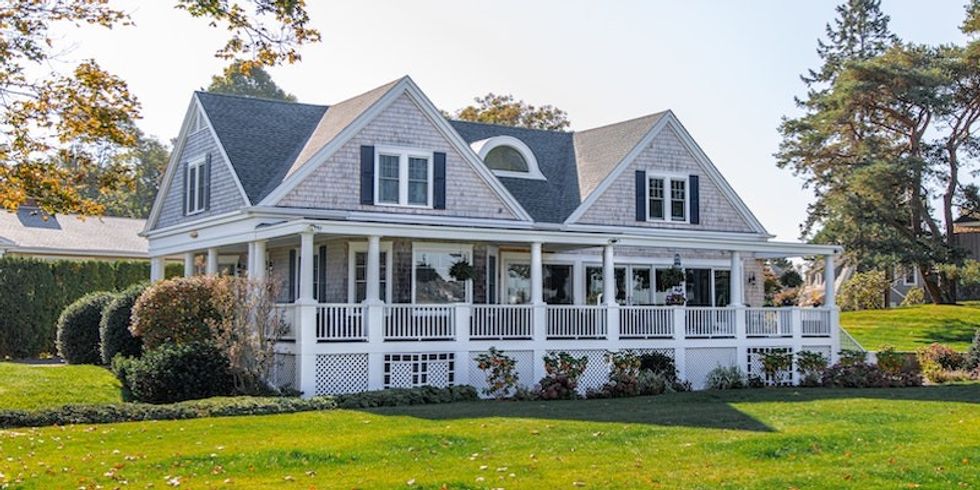January is a month of intentions, beginnings… and, well, divorces.
The first month of the year is often known as ‘Divorce Month’ -- pandemic or not -- and COVID, along with all the increased time it's forced people to remain together under one roof, has likely only added to the number of people now seeking separation from their partners.
It makes sense in theory. Severing ties right before the holiday season isn’t always ideal if kids are involved; the holidays can put stress on already fragile relationships; December is a time of reflection; and January is synonymous with fresh starts.
This January, of course, COVID-19 continues -- as it has done all year -- to be a further factor.
“I’ve found that the number of divorcing couples has increased since the early weeks of COVID,” confirms Daniella Gold, a Toronto-based real estate agent who specializes in divorce and the sale of the matrimonial home.
Gold points to the pressure of being confined to the home together, which often compounds existing relationship issues. “Now that we’ve endured months of hardship -- people losing their jobs, dealing with the challenges of working from home, home schooling and more -- I expect that this will only cause a further increase in the number of couples who are breaking up,” she says.
Of course, the initial decision to part ways, to separate -- a divorce in Canada legally requires one year of separation, don't forget -- is only the first of a long list of decisions that need to be made. And what to do with a shared property is most often at the top of that list.
READ: Why Hasn’t the Much-Feared “Mortgage Deferral Cliff” Happened?
According to Gold, misconceptions about divorce and real estate tend to focus on who is entitled to reside in the matrimonial home, who actually owns the home, and whether or not the home can be sold -- all things that can vary depending on whether the couple is common-law or in fact married.
“The law treats common-law couples differently in terms of assets, including the home,” says Gold.
As opposed to married spouses, who have a right to possess the matrimonial home that can’t be defeated without the consent of the other spouse (or a court order), common-law status isn’t considered legally binding in Ontario.
“The person registered on the property can mortgage, sell, or dispose of the home without the common-law spouse’s consent,” says Gold. “Regardless of whose name is on the official documentation and ownership for the house, as soon as a married couple share the home, it becomes property of both parties. It doesn’t matter if the home was obtained through inheritance, individual purchase, or familial loans -- as long as partners shared the home prior to the date of separation, it’s considered the matrimonial home.”

In general, the decision to sell the property is predominantly a financial one.
“Sometimes, one party can buy the other party’s share in the matrimonial home so that they can remain in the home,” says Gold. Often selling the home is necessary, however, because neither party can afford to keep it on their own, or because one party refuses to sell to the party who is able to buy them out, says Gold. In some cases, the sale is court ordered. “It’s imperative that the parties have an accurate opinion of value for the subject property in all cases, but even more so when the home is to be purchased by either party,” she says.
The reality is that the matrimonial home is usually the largest asset the couple owns. "The proceeds of the sale of that home is what is required for both parties to purchase or rent their own respective homes," says Gold. "The money they receive from the sale of the home may constitute the majority of the settlement."
So, what happens to the mortgage?
The mortgage is affected based on Gold's aforementioned factors, as well as the terms of the existing mortgage. “Distribution of funds from the sale of the home may or may not be used to pay off the mortgage,” says Gold. “Depending on where the couple is in the process of the separation, the funds may sit in a trust account until a final and complete separation agreement has been signed. In other situations, some of the funds or even all of the funds may be released.”
READ: The Question of Having to Pay a Mortgage Penalty Isn’t If, It’s When
Avoiding sugarcoating anything, Gold warns that dealing with divorce-related real estate isn’t always an easy ride. She points to typical power struggles between couples when it comes to listing and selling the home.
“There may be arguments about everything from list price, closing dates, the showing process, and how information is shared, to signage, marketing, prepping the home for sale, who to use as a lawyer for the closing of the transaction and more,” says Gold. “The answers and guidance must factor in both the legal obligations (is there a court order that exists and spells out some of these specifics?), as well as what are ultimately best practices in the sale of the home.”
One (big) thing to keep in mind, says Gold, is that the implications of leaving the matrimonial home during separation can be enormous.
“The general consensus is that unless you or your children are in physical danger, it’s best not to leave the home until matters are resolved,” says Gold. “If you do leave your home, you are unlikely to be taking your children with you. This sets up a de-facto parenting arrangement and the co-parent then becomes the primary caregiver of the children. While this isn’t irreversible, the challenge of trying to regain custody can be arduous and costly.” Leaving the home and the kids may also place you in a position of having to pay spousal and child support right away, warns Gold.
Another thing to consider when selling your home in the event of a dissolved marriage is an element of "keeping up appearances" for prospective buyers to achieve the most lucrative sale. You don't want potential buyers to think you're desperate to sell (even if you are) and that they can subsequently purchase it for less. As a result, Gold keeps the reason of the sale quiet.
“We want to sell not only the home but the image of a happy home life,” she says. “Having said that, no matter the situation, I’m a big believer in making the home look welcoming, and staging is almost always involved. A home that looks not only beautiful but also inviting and cozy is what we hope to achieve in staging.”
So, maybe keep those wedding and family photos on the walls a little longer if you can.






















